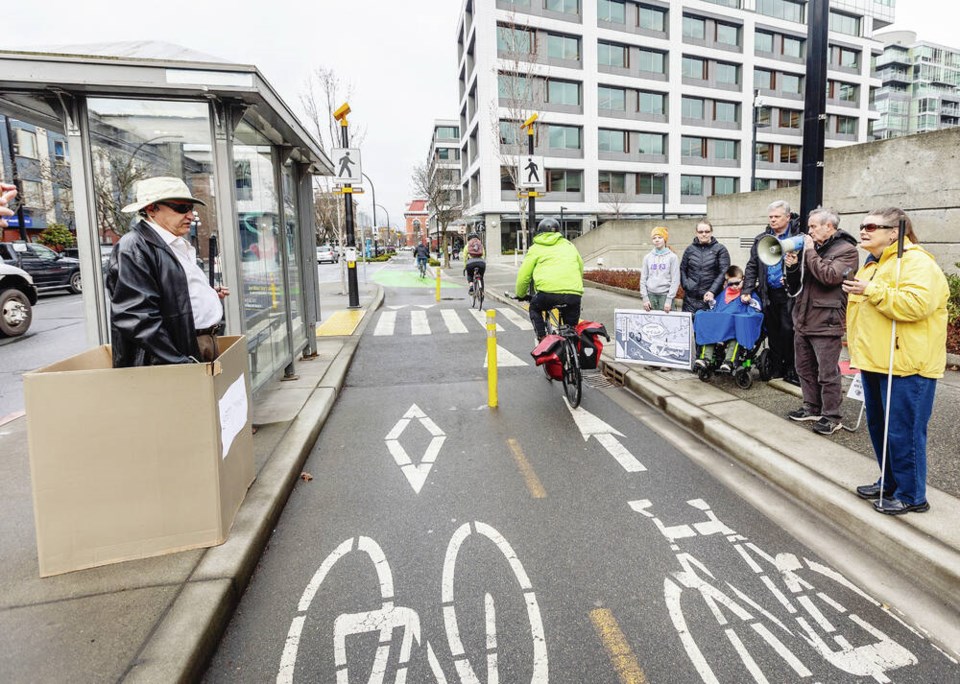A commentary by an advocate for blind persons who lives in Victoria.
Hardscape bike lanes and floating island bus stops have been installed, as we know, along Victoria’s Pandora Avenue and on Wharf Street near Yates. This infrastructure was installed for the safety of cyclists, but at the expense of the safety and accessibility of blind transit pedestrians.
Since 2018, the Canadian Federation of the Blind (CFB) advocated for change regarding this dangerous infrastructure.
When the City of Victoria showed no concern about our voiced safety concerns, CFB turned to the sa国际传媒 Human Rights Tribunal. CFB received pro-bono law assistance, thanks to Crease Harman, and received donations from individual supporters, including the blind community.
The tribunal deemed the bike lanes and floating island bus stops infrastructure as “daunting” for the blind and discriminatory. They issued a cease and desist order.
Yet, the city fought the blind, intent to deem the infrastructure as acceptable.
Then, tribunal member Norman Trerise decided a solution on his own, without consulting the blind case complainants about a meaningful solution to the discriminatory infrastructure.
His solution — a flashing amber light, with accompanying audio signal at each floating bus stop bike lane crosswalk. The audio signal confirms the danger to our safety with its message, warning: “Cross with caution, vehicles may not stop.” The only thing this solution seems to have served is the city’s insurance, in case an accident happens.
In the end, both the tribunal and the city did not come through with a decent judgment or any beneficial change to address the accessibility and safety of the blind.
The flashing light and audio signal made the situation more dangerous by giving a false sense of security. Hopefully, no one will put full trust in this so鈥慶alled solution, step out into the lanes and assume all cyclists will pay attention, obey, and stop.
Common sense says we all must be in charge of our own safety. We have learned this as children. Many of us travel independently and want to remain independent and not be dependent on others for our mobility and safety. No one should take this from another.
Until recently, buses and bus stops were accessible. Buses pulled in to the bus stops at the safety of the sidewalk curbs. It all worked well, made sense and was safe. Then the new-fangled infrastructure got installed.
Now, try finding and figuring out a floating island bus stop, let alone cross the bike lanes. We once suggested to Victoria’s mayor and council to be blindfolded and try their luck. No one took the challenge. We get it.
And let’s not forget, bike lanes are also used by heavier, faster e-bikes and other modes of transportation — none of them able to be heard (especially on busy streets) or be able to stop fast if needed.
And, the knowledge that most cyclists ride right through bike lane crosswalks doesn’t offer a sense of security.
Seriously, hopefully no one or any guide dog will get injured or killed. Even a close call can destroy a guide dog’s confidence to work, and potentially end its career. And yes, white canes have been hit and mangled.
At the end of this lengthy tribunal case, there was no choice for us but to settle, although we were’t happy with the results. The case needed to come to a close.
No one should have to fight for rights. This infrastructure took away independence and safe mobility from the blind and others who are challenged in our community.
It should not be up to citizens to try to resolve problems created by poorly-designed infrastructure, and we should not be expected to compromise on our safety.
The Blind Persons Rights Act, from 1974, it should be followed. There is also the Seven Principles of Universal Design, which should also be followed.
For what other reason do these exist? People who are blind are contributing members of society and pay income, property, sales and other taxes, too.
Although our efforts on this case resulted with no beneficial change for the blind, hopefully some essence of our advocacy made a mental impact on politicians and future infrastructure planners.
Maybe due to our work, future bus stops will truly be inclusive. Maybe we will have made a difference after all.
>>> To comment on this article, write a letter to the editor: [email protected]



